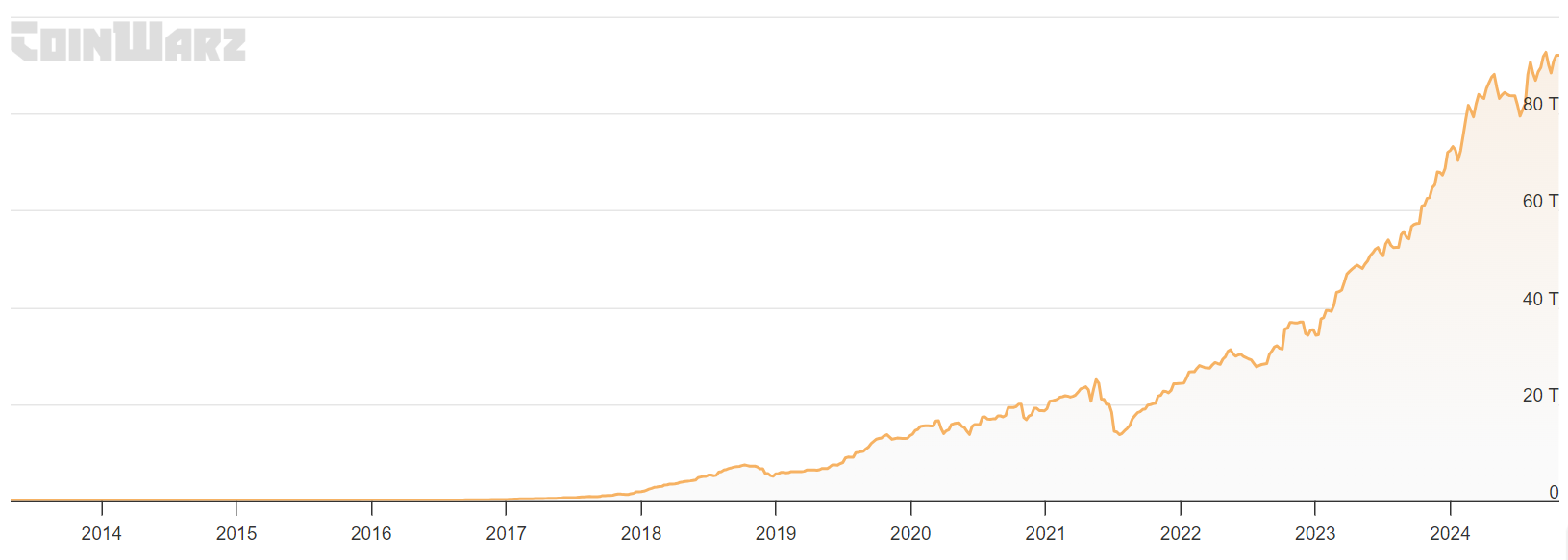The publicly-listed Bitcoin (BTC) miner from Wall Street, BitFuFu (NASDAQ: FUFU), announced today (Tuesday) its plans to acquire a majority stake in an 80-megawatt (MW) crypto mining facility in Ethiopia. The US company is seeking access to cheaper energy in East Africa due to increasingly lower margins in the BTC mining industry.
The problem lies in the rising costs. For BitFuFu, they increased by 170% over the past year, shrinking net profit by 75%.
Wall Street Bitcoin Miner BitFuFu Purchased BTC Mine in Ethiopia
The acquisition will boost BitFuFu’s total hosting capacity to over 600 MW, with approximately 13% now under direct ownership and operation by the Nasdaq-listed company. This represents a departure from BitFuFu’s previous asset-light approach, where third parties hosted all of its 522 MW capacity as of June 30, 2024.
When equipped with the latest Bitmain S21-series miners, the Ethiopian facility is expected to add potential mining capacity of 4.6 EH/s. Notably, the site’s power costs average below $0.04 per kilowatt-hour, which BitFuFu anticipates will lower its overall Bitcoin production expenses.
“This acquisition is a critical milestone as we work to vertically integrate and transition towards a more diversified and resilient portfolio of Bitcoin mining sites,” Leo Lu, CEO and Chairman of BitFuFu, commented. “As we integrate this facility into our global infrastructure, we can capitalize on lower energy costs to reduce Bitcoin production expenses, expand our operational capacity, and enhance profitability.”
Crypto Miners Are Cutting Costs
BitFuFu’s decision to acquire the Ethiopian facility comes as part of a broader strategy to strengthen its competitive position in the mining market. With the majority of its current mining infrastructure based in the United States, this acquisition could help boost mining profitability.
The company plans to implement technological upgrades at the new plant to enhance energy efficiency and mining capacity. The latest report from BitFuFu, along with the general trends in the BTC mining industry, shows that this move is essential. In Q2 2024, the company earned $129 million, which is a 70% increase compared to last year. However, net profit dropped almost fourfold, from $5.1 million to $1.3 million, due to significantly higher mining costs.
“We have already begun planning for technological upgrades to improve energy efficiency and mining capacity at this site,” Lu added. “Moving forward, we aim to strengthen our global position by acquiring or building additional facilities and drive further innovation in the digital asset mining sector while delivering long-term value to our shareholders.”
As Finance Magnates reported last month, Bitcoin miners revenue fell to $827.56 million, the lowest since September 2023. It also marked a 57% drop from March’s peak, highlighting growing challenges in the mining sector, including all-time high difficulty of the mining process.

To fight this unfavorable trend, BTC mining companies are diversifying into AI and high-performance computing to boost revenues. VanEck’s head of digital assets research, Matthew Sigel, estimates that this strategic pivot could unlock $38 billion in value for mining companies by 2027.
The publicly-listed Bitcoin (BTC) miner from Wall Street, BitFuFu (NASDAQ: FUFU), announced today (Tuesday) its plans to acquire a majority stake in an 80-megawatt (MW) crypto mining facility in Ethiopia. The US company is seeking access to cheaper energy in East Africa due to increasingly lower margins in the BTC mining industry.
The problem lies in the rising costs. For BitFuFu, they increased by 170% over the past year, shrinking net profit by 75%.
Wall Street Bitcoin Miner BitFuFu Purchased BTC Mine in Ethiopia
The acquisition will boost BitFuFu’s total hosting capacity to over 600 MW, with approximately 13% now under direct ownership and operation by the Nasdaq-listed company. This represents a departure from BitFuFu’s previous asset-light approach, where third parties hosted all of its 522 MW capacity as of June 30, 2024.
When equipped with the latest Bitmain S21-series miners, the Ethiopian facility is expected to add potential mining capacity of 4.6 EH/s. Notably, the site’s power costs average below $0.04 per kilowatt-hour, which BitFuFu anticipates will lower its overall Bitcoin production expenses.
“This acquisition is a critical milestone as we work to vertically integrate and transition towards a more diversified and resilient portfolio of Bitcoin mining sites,” Leo Lu, CEO and Chairman of BitFuFu, commented. “As we integrate this facility into our global infrastructure, we can capitalize on lower energy costs to reduce Bitcoin production expenses, expand our operational capacity, and enhance profitability.”
Crypto Miners Are Cutting Costs
BitFuFu’s decision to acquire the Ethiopian facility comes as part of a broader strategy to strengthen its competitive position in the mining market. With the majority of its current mining infrastructure based in the United States, this acquisition could help boost mining profitability.
The company plans to implement technological upgrades at the new plant to enhance energy efficiency and mining capacity. The latest report from BitFuFu, along with the general trends in the BTC mining industry, shows that this move is essential. In Q2 2024, the company earned $129 million, which is a 70% increase compared to last year. However, net profit dropped almost fourfold, from $5.1 million to $1.3 million, due to significantly higher mining costs.
“We have already begun planning for technological upgrades to improve energy efficiency and mining capacity at this site,” Lu added. “Moving forward, we aim to strengthen our global position by acquiring or building additional facilities and drive further innovation in the digital asset mining sector while delivering long-term value to our shareholders.”
As Finance Magnates reported last month, Bitcoin miners revenue fell to $827.56 million, the lowest since September 2023. It also marked a 57% drop from March’s peak, highlighting growing challenges in the mining sector, including all-time high difficulty of the mining process.

To fight this unfavorable trend, BTC mining companies are diversifying into AI and high-performance computing to boost revenues. VanEck’s head of digital assets research, Matthew Sigel, estimates that this strategic pivot could unlock $38 billion in value for mining companies by 2027.





